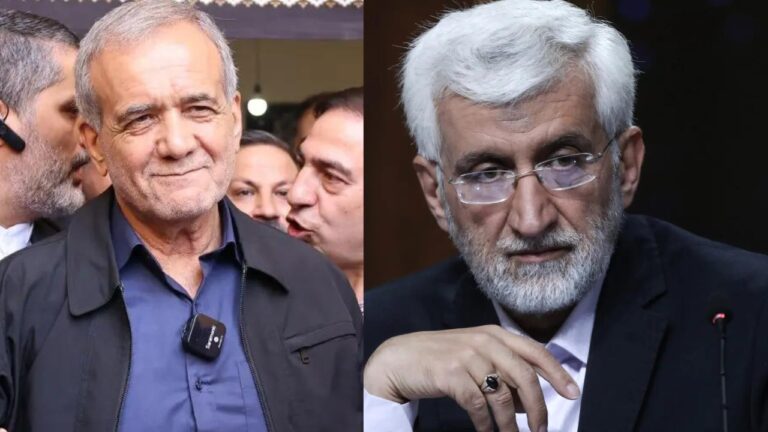In the Iranian presidential runoff election, reformist candidate Massoud Pezeshkian was leading hardline candidate Saeed Jalili by more than 2 million votes early on Saturday.
Massoud Pezechkian, a notoriously low-profile moderate candidate, is expected to win the presidential runoff election on Friday, Reuters sources said.
“The counting is over and the opponents have been informed of the results. Pezeshkian is leading his hardline rival Said Djalili by about three million votes,” said the source, who requested anonymity. The results have not yet been made public.
Earlier, election spokesman Mohsen Eslami said Pezeshkian had received at least 11.1 million votes, while Jalili had received nine million.
The Interior Ministry reported that Pezeshkian is leading the election based on preliminary results.
Footage circulating on various social media platforms showed Pezeshkian’s supporters celebrating by dancing in the streets of several cities and drivers honking their car horns in celebration.
In Pezeshkian’s hometown of Urmia in the northwest, residents were seen handing out sweets to passersby in the streets in celebration.
While the election is not expected to have a major impact on the Islamic Republic’s policies, the president will play a key role in the process of selecting a successor to 85-year-old Supreme Leader Ayatollah Ali Khamenei, who has the final say on major national issues.
The election follows a June 28 first-round vote that saw the lowest voter turnout since the 1979 Islamic Revolution. Iran has traditionally valued voter turnout as a sign of support for its Shiite theocracy, but the country is now economically strained by sanctions and faces widespread demonstrations and a harsh crackdown on dissent.
Pezechkian, the only moderate of the original four candidates, and Djalili, a hardline former nuclear negotiator who is a strong supporter of closer ties with Russia and China, were the top two candidates and advanced to a runoff election.
The ministry also reported that early figures showed turnout at about 50 percent, an increase from the first round of voting. State television aired footage showing medium-sized queues at various polling stations across the country.
But contrasting videos circulating online appear to show a different picture, with some polling stations appearing empty, and surveys in many parts of the capital, Tehran, showed low voter turnout.
Massoud Pezechkian, a notoriously low-profile moderate candidate, is expected to win the presidential runoff election on Friday, Reuters sources said.
“The counting is over and the opponents have been informed of the results. Pezeshkian is leading his hardline rival Said Djalili by about three million votes,” said the source, who requested anonymity. The results have not yet been made public.
Earlier, election spokesman Mohsen Eslami said Pezeshkian had received at least 11.1 million votes, while Jalili had received nine million.
The Interior Ministry reported that Pezeshkian is leading the election based on preliminary results.
Footage circulating on various social media platforms showed Pezeshkian’s supporters celebrating by dancing in the streets of several cities and drivers honking their car horns in celebration.
In Pezeshkian’s hometown of Urmia in the northwest, residents were seen handing out sweets to passersby in the streets in celebration.
While the election is not expected to have a major impact on the Islamic Republic’s policies, the president will play a key role in the process of selecting a successor to 85-year-old Supreme Leader Ayatollah Ali Khamenei, who has the final say on major national issues.
The election follows a June 28 first-round vote that saw the lowest voter turnout since the 1979 Islamic Revolution. Iran has traditionally valued voter turnout as a sign of support for its Shiite theocracy, but the country is now economically strained by sanctions and faces widespread demonstrations and a harsh crackdown on dissent.
Pezechkian, the only moderate of the original four candidates, and Djalili, a hardline former nuclear negotiator who is a strong supporter of closer ties with Russia and China, were the top two candidates and advanced to a runoff election.
The ministry also reported that early figures showed turnout at about 50 percent, an increase from the first round of voting. State television aired footage showing medium-sized queues at various polling stations across the country.
But contrasting videos circulating online appear to show a different picture, with some polling stations appearing empty, and surveys in many parts of the capital, Tehran, showed low voter turnout.

